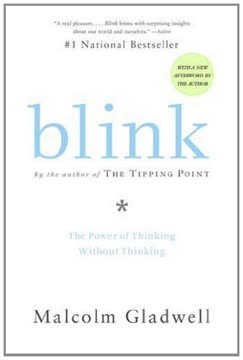重点摘要
1. 快速认知:无需思考的思考力量
“在最初的两秒钟内知道的力量并不是幸运的少数人神奇地获得的礼物。这是一种我们都可以为自己培养的能力。”
快速认知是一种强大的认知能力。 它使我们能够基于非常有限的信息做出快速且通常准确的判断。这个过程,Malcolm Gladwell称之为“薄片切割”,发生在我们的无意识中,可以导致非常有洞察力的决策。
快速认知的实际例子:
- 艺术专家瞬间识别伪造品
- 关系专家在仅观察几分钟后预测离婚
- 经验丰富的消防员在危险显现之前感知到危险
虽然快速认知非常有用,但理解其局限性和潜在偏见也很重要。Gladwell认为,通过认识和磨练这种能力,我们可以在生活的各个方面做出更好的决策。
2. 薄片切割:用有限信息做出准确判断
“薄片切割指的是我们的无意识基于非常狭窄的经验片段在情境和行为中找到模式的能力。”
薄片切割是一种快速认知形式。 它涉及集中于少数关键信息片段以做出快速且通常准确的判断。这种能力使我们能够高效处理大量信息,并在时间或信息有限的情况下做出决策。
薄片切割的关键方面:
- 依赖于无意识的模式识别
- 通常比长时间分析更准确
- 可以通过练习和专业知识提高
- 如果理解不当,容易受到偏见和错误的影响
Gladwell提供了许多薄片切割的实际例子,从心理学家预测关系结果到医疗专业人员诊断心脏病。他认为,理解和改进我们的薄片切割能力可以在各个领域带来更好的决策。
3. 适应性无意识:我们的隐藏心理处理器
“我们的无意识是一种强大的力量。但它是易犯错的。它可能会被干扰、分心和禁用。我们的本能反应经常不得不与各种其他利益、情感和情绪竞争。”
适应性无意识是我们大脑的快速决策者。 它快速高效地处理大量信息,使我们能够在没有意识思考的情况下应对复杂情况。这个系统负责我们许多直觉判断和瞬间决策。
适应性无意识的特征:
- 比有意识思考更快运作
- 整体处理信息
- 能够在有限数据下做出复杂判断
- 受过去经验和学习模式的影响
- 容易受到偏见和错误的影响
理解适应性无意识的作用可以帮助我们欣赏直觉的力量,同时也认识到其局限性。Gladwell认为,通过了解这个系统的工作原理,我们可以学会利用其优势并减轻其在决策过程中的弱点。
4. 快速判断的阴暗面:当薄片切割出错时
“沃伦·哈丁错误是快速认知的阴暗面。它是许多偏见和歧视的根源。”
快速判断可能导致严重错误。 虽然快速认知非常有用,但当基于表面或无关信息时,它也可能导致偏见、歧视和错误决策。Gladwell用“沃伦·哈丁错误”来描述这种现象,指的是一位无能总统主要基于外貌和举止当选。
导致错误快速判断的因素:
- 无意识的偏见和刻板印象
- 过度依赖表面特征
- 缺乏相关信息或背景
- 压力或时间紧迫
- 未能认识到直觉的局限性
Gladwell强调理解这些潜在陷阱并制定策略来对抗它们的重要性。通过意识到我们倾向于快速、有时错误的判断,我们可以努力做出更深思熟虑和公平的决策。
5. 启动效应:微妙影响如何塑造我们的行为
“我们认为的自由意志在很大程度上是一种幻觉:大多数时候,我们只是自动驾驶,我们的思维和行为——以及我们在瞬间的思维和行为——比我们意识到的更容易受到外界影响。”
启动效应微妙地影响我们的思维和行为。 我们的行为可以显著受到看似微不足道的环境线索或先前经验的影响。这些影响通常在我们无意识的情况下发生,强烈地塑造我们的决策和反应。
启动效应的例子:
- 接触与老年人相关的词语导致步行速度变慢
- 拿着温暖的饮料导致对他人的“温暖”性格的感知
- 看到金钱图像导致更具个人主义的行为
- 专业环境启动更正式的语言和行为
理解启动效应可以帮助我们认识到对决策和行为的微妙影响。Gladwell认为,这种意识可以导致更有意图的决策,甚至可能使我们创造出启动积极行为和思维的环境。
6. 面部表情:心灵的窗口
“当我们做出瞬间决定时,我们真的很容易被我们的刻板印象和偏见所引导,即使是我们不一定认同或相信的那些。”
面部表情揭示我们的真实情感。 我们的面部不断在广播我们的内在状态,通常不受我们意识控制。阅读这些微表情的专家可以对一个人的真实感受和意图有惊人的洞察力。
关于面部表情和情感的关键点:
- 基本情感在各文化中普遍存在
- 不由自主地发生,可能非常短暂
- 可以揭示我们试图隐藏的情感
- 准确阅读它们需要训练和练习
- 在执法、谈判和治疗等领域至关重要
Gladwell探讨了Paul Ekman等人在开发面部表情阅读系统方面的工作。他认为,提高我们阅读这些微妙线索的能力可以增强我们的情商和人际交往技能。
7. 临时自闭症:当压力损害我们的判断力
“在压力条件下,我们不再依赖感官的实际证据,而是退回到一个僵化和不屈的系统,一个刻板印象。”
极端压力会损害我们处理信息的能力。 在高压情况下,我们对细致思考和同理心的正常能力可能会严重受限,导致Gladwell比作临时自闭症的状态。这可能导致糟糕的决策,尤其是在关键时刻。
极端压力对认知的影响:
- 隧道视野和失去周边意识
- 听觉排除(无法听到某些声音)
- 时间扭曲(事件似乎变慢或加快)
- 失去精细运动技能
- 回归到简单的、刻板的思维
Gladwell用执法和军事情况的例子来说明这种“临时自闭症”如何导致悲剧性结果。他主张通过训练和准备来减轻这些高压情境中的影响。
8. 隐性偏见:揭示我们的无意识偏见
“我们的第一印象是由我们的经验和环境生成的,这意味着我们可以通过改变构成这些印象的经验来改变我们的第一印象——我们可以改变我们薄片切割的方式。”
隐性偏见无意识地影响我们的判断。 这些偏见由我们的经验和环境形成,可以在我们不知情的情况下影响我们的决策和行为。它们经常与我们有意识持有的信念相矛盾,可能导致无意的歧视。
关于隐性偏见的关键点:
- 可以通过隐性联想测试(IAT)测量
- 通常与我们的显性信念和价值观不同
- 受社会刻板印象和个人经验的影响
- 可以影响招聘、医疗和执法等领域的决策
- 可以通过意识和有意接触反刻板印象来减轻
Gladwell探讨了各种关于隐性偏见的研究,展示了这些无意识关联如何影响从工作面试到医疗诊断的一切。他主张认识到并积极努力对抗这些偏见的重要性。
9. 专业知识与直觉:发展快速认知技能
“真正成功的决策依赖于深思熟虑和本能思维之间的平衡。”
专业知识增强快速认知。 通过广泛的经验和练习,专家在其领域内发展出快速、准确判断的能力。这种专业知识使他们能够识别模式并基于新手可能忽略的微妙线索做出决策。
专家直觉的特征:
- 基于广泛的领域特定知识
- 允许快速模式识别
- 专家通常难以表达他们的决策过程
- 在某些情况下比有意识的深思熟虑更准确
- 需要持续的练习和反馈来维持
Gladwell提供了象棋、急诊医学和艺术鉴定等领域的例子,说明专业知识如何导致非常准确的快速判断。他认为,发展这种直觉专业知识需要在特定领域内进行有意的练习和广泛的情境接触。
10. 创造更好决策的条件
“如果你创造了正确的框架,突然间,进行那种流畅、轻松、即兴对话的能力变得容易得多。”
环境因素影响决策质量。 我们做出决策的条件可以显著影响其质量。通过理解和控制这些因素,我们可以创造有利于更好快速认知和决策的环境。
改善决策环境的策略:
- 尽可能减少时间压力
- 最小化干扰和无关信息
- 为决策创建清晰的结构和指南
- 鼓励多样化的观点以挑战假设
- 提供反思和反馈的机会
Gladwell用急诊医学和军事策略等领域的例子来说明如何创造正确的条件可以导致更好的快速决策。他认为,通过关注这些环境因素,组织和个人可以显著改善他们的决策过程。
11. 有意识推理的局限性:当信息越少越好
“作为人类,我们有一个讲故事的问题。我们太快为我们没有真正解释的事情编造解释。”
过度思考会损害决策。 在许多情况下,拥有更多信息或花更多时间分析问题并不会导致更好的决策。有时,我们快速、直觉的判断比我们经过深思熟虑的结论更准确。
信息越少越好的情境:
- 具有许多变量的复杂决策
- 需要模式识别的情况
- 当情感或人际因素很重要时
- 时间紧迫的环境
- 已经发展出专业知识的领域
Gladwell探讨了研究,显示额外信息有时会导致更差的决策,例如在医疗诊断或消费者选择中。他主张认识到何时信任我们的直觉判断以及何时需要更深思熟虑的分析的重要性。
12. 用眼睛倾听:无偏评估的重要性
“为成功的自发性创造条件是快速认知的关键部分。”
无偏评估揭示隐藏的才能。 我们的成见和偏见经常阻止我们识别真正的能力。通过创造无偏评估的条件,例如乐团中的盲选,我们可以发现可能被忽视的才能。
无偏评估方法的好处:
- 减少无意识偏见的影响
- 使注意力集中在相关技能和能力上
- 可以在各个领域增加多样性
- 挑战关于才能的长期假设
- 提高所选候选人的整体质量
Gladwell用乐团盲选的例子,说明这种方法如何显著增加女性被录用的数量,来展示无偏评估的力量。他认为,在其他领域实施类似策略可以导致更公平和有效的选择过程。
最后更新日期:
FAQ
What's Blink: The Power of Thinking Without Thinking about?
- Focus on Rapid Cognition: The book explores "thin-slicing," the ability to make quick judgments based on limited information, often as accurate as those made through extensive deliberation.
- Real-World Examples: Gladwell uses case studies, like the Getty kouros and psychologist John Gottman's work, to show how first impressions can lead to success or failure.
- Dual Decision-Making Systems: It contrasts conscious, analytical thinking with rapid, intuitive thinking, highlighting when to trust instincts.
Why should I read Blink by Malcolm Gladwell?
- Understanding Decision-Making: Gain insights into how decisions are made and the factors influencing judgments, useful in personal and professional contexts.
- Practical Applications: Learn to improve decision-making skills by recognizing intuition's power and avoiding overthinking pitfalls.
- Engaging Narrative: Gladwell's storytelling makes complex psychological concepts accessible and relatable, keeping readers engaged.
What are the key takeaways of Blink?
- Power of First Impressions: First impressions can be powerful and accurate, as shown by art experts recognizing a fake statue instantly.
- Thin-Slicing Explained: "Thin-slicing" is making quick judgments based on limited information, effective in high-pressure situations.
- Caution Against Bias: Warns of snap judgments leading to biases, like the Warren Harding error, where superficial traits mislead us.
What is "thin-slicing" in Blink?
- Definition of Thin-Slicing: It's the ability to find patterns in situations and behavior based on narrow slices of experience, allowing quick assessments.
- Examples of Thin-Slicing: Illustrated through examples like John Gottman's marital success predictions and the Iowa gambling experiment.
- Implications for Decision-Making: Helps recognize the value of instincts and improve quick, effective decision-making.
What is the "Warren Harding error" mentioned in Blink?
- Definition of the Error: It's the tendency to judge abilities based on appearance or superficial traits, not actual qualifications.
- Historical Context: Warren Harding was elected president largely due to his appearance, despite being ineffective.
- Consequences of the Error: Highlights dangers of relying on first impressions, leading to poor decisions in hiring and leadership.
How does Blink explain the role of the unconscious in decision-making?
- Adaptive Unconscious Defined: Introduces the adaptive unconscious, processing information quickly for snap judgments based on limited data.
- Examples of Unconscious Processing: Iowa gambling experiment shows decisions made on gut feelings before reasoning is articulated.
- Implications for Everyday Life: Understanding the adaptive unconscious helps trust instincts and value quick decision-making.
What is the significance of the Implicit Association Test (IAT) in Blink?
- Purpose of the IAT: Measures unconscious biases by assessing speed of associating concepts like race and gender with attributes.
- Findings from the IAT: Reveals many hold implicit biases influencing behavior and decision-making, regardless of conscious beliefs.
- Impact on Society: Highlights need to recognize and address unconscious biases for equality and fairness in hiring and interactions.
How does Blink address the issue of bias in decision-making?
- Recognition of Bias: Biases often stem from rapid cognition and first impressions, leading to unfair judgments based on stereotypes.
- Examples of Bias: Uses examples like the Warren Harding error and IAT findings to show biases affecting decisions in various areas.
- Strategies to Combat Bias: Suggests awareness and active counteraction of biases to improve decision-making and promote fairness.
How does Blink relate to the concept of expertise?
- Expertise Enhances Rapid Cognition: Experts make accurate snap judgments due to extensive experience, honing intuition through practice.
- Training and Practice Matter: Expertise involves interpreting and responding quickly to complex situations, not just knowledge.
- Examples of Expert Intuition: Professionals like doctors and art critics rely on instincts, showing experience leads to accurate judgments.
What role does stress play in decision-making according to Blink?
- Impact of Stress on Cognition: High-stress situations impair judgment, narrowing focus and leading to hasty decisions.
- Examples of Stress-Induced Errors: Police officers misreading intentions due to stress illustrate how it clouds judgment.
- Managing Stress for Better Decisions: Training and preparation help manage stress, improving decision-making under pressure.
How does Blink suggest we can improve our snap judgments?
- Practice and Training: Experience and training enhance accurate snap judgments, refining intuition and decision-making skills.
- Creating the Right Environment: Controlling decision-making context improves outcomes by minimizing distractions and biases.
- Reflecting on Past Decisions: Analyzing past decisions helps recognize patterns and improve future decision-making processes.
What are the best quotes from Blink and what do they mean?
- "Decisions made very quickly...": Highlights the book's thesis that rapid cognition can be as effective as analytical thinking.
- "You can’t judge a book by its cover.": Reinforces looking beyond superficial traits to understand true character and capability.
- "The mind operates most efficiently...": Underscores the adaptive unconscious's role in making quick, effective decisions.
评论
读者发现《眨眼之间》是对快速决策的引人入胜的探索,赞扬了格拉德威尔的叙事技巧和多样的例子。尽管有些人批评书中缺乏具体的建议,但许多人欣赏这本书发人深省的性质。批评者认为它过于简化了复杂的心理学概念,但大多数人同意这是对直觉思维主题的一个有趣且易于理解的介绍。
Similar Books




















